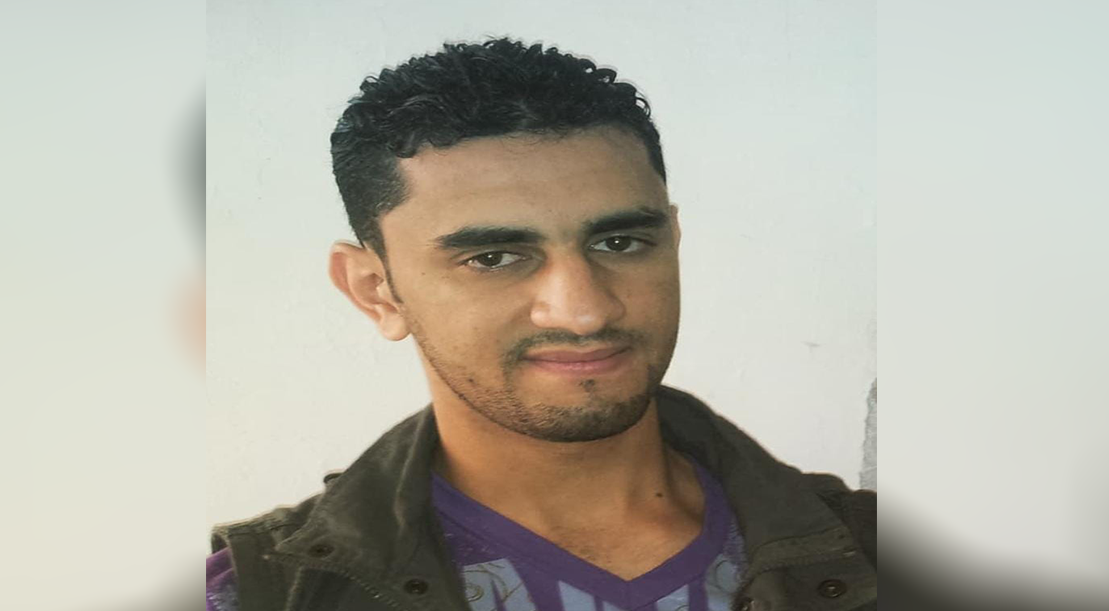Mustafa AbdulKarim Khatam, a Bahraini national, was 22 years old when he was arbitrarily arrested in 2013. He is currently held in Jau prison where he is being denied urgent medical treatment for his worsening condition after also being subjected to torture and ill-treatment on multiple occasions.
On 14 February 2013, Riot police, security police forces, Criminal Investigations Directorate officers, and helicopters surrounded the Karzakan area where Mustafa lived, and the roads for those entering and leaving the village were blocked. Mustafa was outside the house, on the coast with his friends, when they were surrounded, pursued, and arrested without an arrest warrant. Authorities did not even state the reason for the arrest. However, Bahrain TV later announced the arrest of a group of terrorists in possession of a rifle.
Mustafa and his friends were consequently forcibly disappeared for nine days. He was handcuffed behind his back, dragged to a farming area, photographed, beaten violently with weapons and batons, and kicked all over his body. Afterward, he was taken to two areas, photographed there, and then taken to the Criminal Investigations Directorate (CID). On the way, security forces beat him, insulted him, cursed at him, and insulted his sect, religion, and family. For the nine days of the interrogation, Mustafa was subjected to physical and psychological torture, including lashing, suspension, beatings, verbal and physical insults, prevention from sitting, sleeping, eating, praying and entering the bathroom. This led to him losing consciousness multiple times and being transferred to Al-Qala’a clinic five days into the interrogation. Mustafa was transferred to the Public Prosecution Office to admit to possessing a weapon, but every time he denied the charges he would be sent back to be tortured. His lawyer was not allowed to attend the interrogations, and his family was not informed of his whereabouts until 13 days after his arrest following his transfer to Dry Dock Detention Center.
Despite the lack of direct evidence, Mustafa was convicted of possessing shotguns, confronting security forces, and rioting. He was sentenced to 10 years in prison on 15 September 2013. Approximately three months later, the sentence was upheld by the Court of Appeal. In 2015, the sentence was upheld by the Court of Cassation.
Mustafa was subjected to ill-treatment in Dry Dock Detention Center and Jau Prison as well. Three months after his transfer to Dry Dock Detention Center, he was dragged out of his cell, beaten, kicked, insulted, and transferred to solitary confinement for 4 days because he raised his voice during the dawn call to prayer. During the events that took place in March 2015 in Jau Prison, he was again subjected to sectarian insults and torture and was prevented from making phone calls or receiving visitors. Recently, on 26 March 2021, Mustafa was infected with Coronavirus and was transferred to isolation two days after his symptoms appeared. Medical attention was not provided, and the meals provided were delayed and inadequate. He was allowed outside of his cell, which he shares with nine other prisoners, for only half an hour per day, and sanitary products were not provided nor was he allowed to buy them for approximately three months. He was only able to contact his family after he recovered from the virus.
After his recovery, Mustafa began suffering from swelling and pain in the lower abdomen. At the clinic, he was told that he had a hernia and needed surgery. However, he still has not been taken to a hospital in order to undergo the surgery, leaving his family concerned for his health. His surgery, which was scheduled for 2 June, was postponed to 1 August due to the Coronavirus, but Mustafa was not taken to the hospital on that date.
Bahraini authorities’ actions against Mustafa, from his arrest and interrogation to his treatment in prison, are in violation of international law and standards, including the Convention Against Torture, the International Covenant on Civil and Political Rights, and the Mandela Rules. ADHRB calls upon Bahrain to uphold its human rights obligations by annulling Mustafa ’s conviction in absence of incriminatory evidence against him and ensuring that any subsequent retrial is consistent with due process and fair trial rights. ADHRB additionally urges the authorities to investigate claims of torture and ill-treatment by prison officials, to hold those officials accountable, and to provide Mustafa and all prisoners with proper and timely medical treatment.





